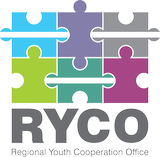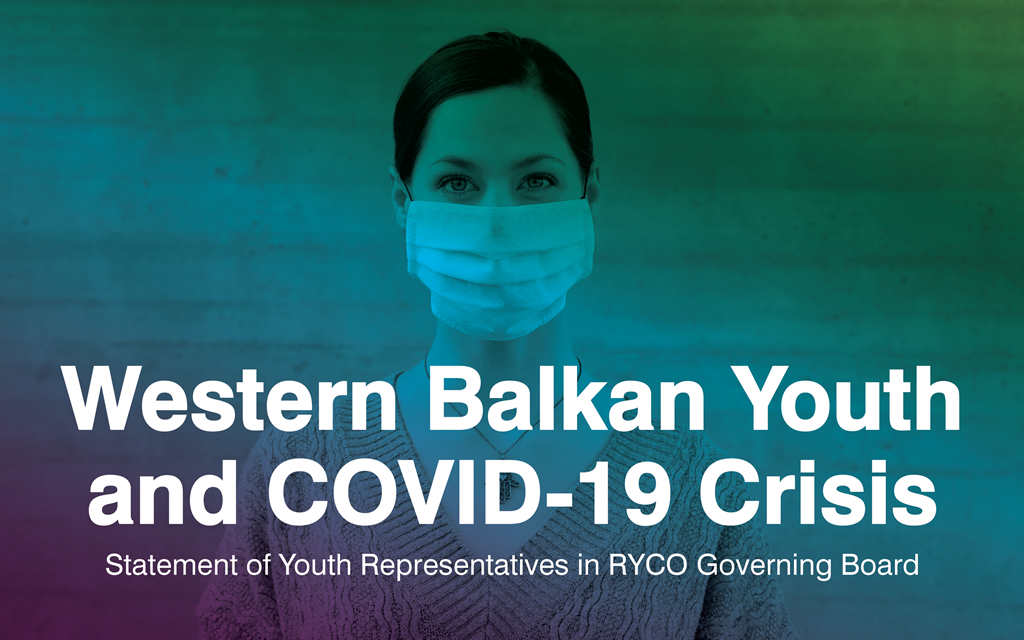WESTERN BALKANS – The five Youth Representatives in the RYCO Governing Board coming from Albania, Kosovo*, Montenegro, North Macedonia, and Serbia issue the following statement on the COVID-19 crisis and its impact on the youth in the Western Balkans.
Taking into account the negative effects of the COVID-19 pandemic on various aspects of our lives and societies, and especially the fact that the population of youth represents the most vulnerable category in these uncertain times, we, the Youth Representatives in the RYCO Governing Board, hereby:
-
urge the governments of the RYCO Contracting Parties to always take into consideration the best interest of young people when reshaping and adapting the education process to the current circumstances, paying special attention to youth with fewer opportunities, e.g. young people with no (or hindered) access to Internet, digitally illiterate young people, young people with no necessary learning gadgets, etc. It is of high importance to provide youth with equal possibilities to enjoy their right to education, so that they could develop their full potential (e.g. to give out ICT vouchers to those in need, etc.);
-
stress out the need to upskill teachers, educators and trainers in terms of using online education tools, in a way that young people feel the shortcomings of online education as little as possible, as well as in a way that we get the most out of the processes of digitalization of education which are taking place at the moment in all the Contracting Parties;
-
encourage the Contracting Parties, CSOs and other relevant stakeholders to not give up on regional youth cooperation. We agree without restraint that the process of fostering youth cooperation (through youth exchanges) has been slowed down, yet it is highly important for young people to socialize, exchange experiences, thoughts, good practices and be the leaders of intercultural communication and reconciliation in the region. It is therefore crucial to constantly create innovative, appealing and effective methods aiming at gathering together youth from the Western Balkans;
-
call on the Contracting Parties, CSOs, health authorities and other relevant stakeholders to address the mental health aspect of the crisis, putting a special focus on its negative effects on the young people, as they suffer the most due to being in the process of maturing and growing up. It is because of restrictions on movement, uncertainty, isolation, the loss of loved ones, fear for the future, etc. that young people are facing anxiety and depression to a worrying extent. It is therefore essential that the governments adopt mental health policies, integrating them into public health policy, while closely cooperating with CSOs, healthcare workers, carers of children, etc.;
-
encourage teachers, professors and school psychologists to take a special care of mental health of their students, e.g. by organizing online mental health workshops/courses, individual consultations and generally provide bigger support during the online learning process, in order to help them to adjust to the new manner of living and overcome mental issues that arose due to the current crisis;
-
welcome politicians and other decision-makers, public figures and others to refrain from spreading hate speech and/or fake news, thus creating an unhealthy atmosphere that further affects the mental health of young people, and can lead to an increase in the degree of intolerance of young people to diversity. These uncertain times affect us all, but mostly us, young people, who are naturally more prone to others’ influence and are now searching for answers to various questions that are the result of the uncertainty that has become commonplace;
-
call on the Contracting Parties, CSOs and other relevant stakeholders to put a special focus on enabling young people to participate in decision-making processes even during the crisis. It is essential that young people express their needs and draw attention to issues they are currently encountering, so that adequate and quality policies targeting young people could be created. This means that no decision concerning the young people should be made without young people involved in the process;
-
encourage youth to raise their voice, share their thoughts, ideas and actively participate in decision-making processes. Peer support is of great importance in these times of isolation and restrictions on movement, which is why we additionally call on youth to support each other, show empathy and motivate one another to do what is in their power to contribute to repairing the consequences of the crisis;
-
encourage the Contracting Parties to allocate additional funds and create policies to support the CSOs’ work with young people, especially for dealing with the consequences imposed by the COVID-19 pandemic that the young people are facing;
-
urge the Contracting Parties to create policies addressing the problem of rapid increase in youth unemployment, in order to avoid or mitigate as much as possible the negative long-term consequences of the crisis on the participation of youth in the labor market, with a special focus on public policies aiming to promote and foster (social) entrepreneurship among young people (e.g. introducing tax relief measures, including youth in the support schemes, etc.);
-
encourage the Contracting Parties to intensify the institutional cooperation in the region, exchange experiences and good practices, and work jointly on finding common solutions to more easily overcome this crisis, especially when it comes to the issues that plague young people from the region;
-
call on citizens to respect protective measures imposed by the governments of the respective Contracting Parties, in order to mitigate the spread of the virus and to contribute to acceleration of the “healing“ of the region;
Finally, we encourage CSOs to apply for the allocation of funds through the 4th RYCO Open Call, launched specifically to support CSOs in the process of fostering youth reconciliation and regional cooperation during and post COVID-19 crisis. As well engage in the provided activities of RYCO.
Françeska Muço, Youth Representative of Albania
Edis Papashtica, Youth Representative of Kosovo
Andrea Mićanović, Youth Representative of Montenegro
Vladimir Gjorgjevski, Youth Representative of North Macedonia
Marko Kostić, Youth Representative of Serbia
Background:
RYCO’s unique governance system brings together government and civil society representatives to ensure young people are represented at all levels within the organisation.
The RYCO Governing Board is the organization’s highest decision-making authority. It is composed of two representatives from each Contracting Party: one government representative in direct charge of youth policy, and one youth representative. The youth representatives are no younger than 18, and no older than 30 years of age at the start of their mandate. They serve a mandate of three years, with no possibility of extension. Each Contracting Party selects a youth representative using its own mechanisms in a transparent, inclusive and democratic manner and in close cooperation with civil society dealing with youth. Decisions of the Governing Board are taken by consensus.
________________
*This designation is without prejudice to positions on status, and is in line with UNSCR 1244 and the ICJ Opinion on the Kosovo Declaration of Independence



